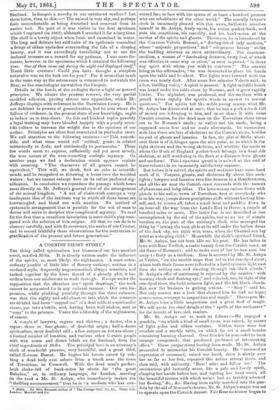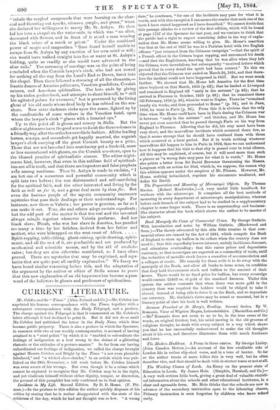A CORNISH GHOST STORY.*
THE thing called spiritualism has blossomed out into another novel, entitled Stella. It is clearly written under the influence of the spirits, or, most likely, the nightmares. A more extra- ordinary jumble of little bits of flowery verbiage, written in a confused style, frequently ungrammatical, always senseless, and tacked together by the loose thread of a ghostly plot, it has seldom been our misfortune to wade through. Except under the supposition that the sketches are" spirit drawings," the work cannot be accounted for in any rational manner. Our own im- pression, while plodding painfully through the three volumes, was that the eighty and odd chapters into which the contents are divided had been "rapped out" of a deal table at a spiritualist stsance, put into a bottle, and, having been well shaken, sent as "copy" to the printers. Under the editorship of the nightmares, of course.
A Couple of lawyers, rogues and thieves ; a doctor, also a rogue ; three or four ghosts, of doubtful origin ; half-a-dozen spiritualists, more doubtful still ; a few corpses on the sea-shore ; a limited number of lunatics, and various other Cornish people with wax noses and divers labels on the forehead, form the chief ingredients of Stella. The principal hero is an attorney's clerk of wonderful prowess, very beautiful, and a great thief, called Norman Pascal. He begins his heroic career by rob- bing a dead body cast ashore from a wreck near the town of Trevethan, in Cornwall. With the dead man's pocket- book choke-full of bank-notes he starts for "the great Babylon," or, in ordinary language, for London, meeting on the road a Mr. St. Aubyn, who immediately makes the "thrilling announcement" that he is "a medium who has con- * Melia. By Mrs. Bennett, author of "The Cottage Girl," &a, &e., Three Tole. London : Maxwell and Co. versed face to face with the spirits of at least a hundred persons who are inhabitants of the other world." The rascally lawyer's clerk is immensely pleased with this news, forthwith attaches himself to St. Aubyn, freely opentiOlis stolen pocket-book, and puts his scepticism, his rascality, ind his bank-notes at the service of the spirits and ghosts. Thereupon he is introduced to the Countess Valeria Romani, a " distinguished lady medium," whose "majestic, proportions" and " voluptuoas beauty" strike the budding attorney as most extraordinary. The countess- medium, a woman of "fascinating features, every look of which was effective in some way or other," at once inquired, " Is there any spirit with whom you wish to converse ?" The answer being in the affirmative, "he was instructed to place his hands upon the table and be silent. The lights were lowered until the room was nearly dark. After some five minutes Videria said, in a low, thrilling voice, A spirit is present.' A light metallic knock was heard under the table close by Norman, and it grew rapidly louder. The alphabet was produced, and the medium with a pencil wrote rapidly the spirit's words in answer to several questions." The spirits tell the noble young scamp, what Mr. St. Aubyn has discovered at once, that he has a pocket-book fall of money not belonging to him, and most share it with some Cornish cousins, for the dead man on the Trevethan shore turns out to be Norman's uncle; or rather not his uncle, being a supposed uncle first and no uncle afterwards. In connection with him there are lots of skeletons on the Cornish shore, besides no end of ghosts and lunatics. In fact, the plot of Stella, what- ever there is of it, hinges upon the nice point, as to which is the right skeleton and the wrong skeleton, and whether the uncle to whom the Bank of England packet-book belongs is a bond fide skeleton, or still wandering in the flesh at a distance from ghosts and mediums. This important question is solved at the end of three volumes in an immensely satisfactory manner.
But before it is solved, the spirits and mediums have some hard work of it. Corpses, ghosts, and skeletons fly about like rush- lights ; lawyers and lunatics rave like demons in a thunderstorm, and all the air near the Cornish coast resounds with the tumult of phantoms and hobgoblins. The hero-scamp rushes down with pistols to his native town of Trevethan, fires at everybody who is in his way, jumps down precipitous cliffs without hurting him- self, and, to crown all, takes a small boat awl paddles down in an hour all the way from the Land's End to Dover, a couple of hundred miles or more. The latter feat is not described as one accomplished by the aid of the spirits, but as au act of simple heroism on the part of the attorney's clerk, who managed the thing by "letting the boat glide at its will under the hollow dome of the dark sky, set thick with stars, when the Channel sea lay quiet as a sleeping child." Meanwhile the clerk's spiritual friend, Mr. St. Aubyn, has not been idle on his part. He has fallen in love with Rose Trellick, a rustic beauty from the Cornish coast, an old flame of Norman's; and to make sure of her he has sent her away b Italy as a medium. Rose is accosted by Mr. St. Aubyn at Venice, "on the marble steps that led to the sun-dyed river, where both their forms were reflected in a lurid crimson light cast from the setting sun, and slanting through ink-black clouds." Sr. Aubyn's offer of matrimony is rejected by the maiden "with burning cheek and flashing eye ;" and rejected, too, in sight of the sun-dyed river, the lurid crimson light, and the ink-black clouds. But now the business is getting serious. " Stay ! ' said he. Her only answer was a look that showed him he had no hope ; none—none,—except in magnetism and magic." Thereupon Mr. St. Aubyn tries a little magnetism and a great deal of magic. We will quote the chief details of the " spells of' the enchanter" for the benefit of love-sick readers.
Mr. St. Aubyn set to work as follows:—Ho engaged a gondola, "on which a kind of small room was raised, by means of light poles and silken curtains. Within there were low couches and a marble table, on which he set a small brazier containing burning charcoal. Over this fire he proceeded to burn strange compounds that produced perfumes of intoxicating effect." These preparations having been made, Mr. St. Aubyn proceeded to mesmerize his Cornish beauty. He "assumed an expression of command, raised one hand, drew it slowly over her as far as her feet, repeated this action several times, and then said, with authority, Rose ! arise and follow me.' The unconscious gitl instantly arose, like a pale and lovely spirit, clasping her hands before her, and holding her head erect, all the beautiful tresses with which nature had so lavishly adorned her flowing," &c., &c. Having been safely marched into the gon- dola by the aid of Mesmer's charms, Mr. St. Aubyn's magic was set to operate upon the Cornish damsel. Fair Rose no sooner began to
"inhale the magical compounds that were burning on the char- coal and throwing out sparks, crimson, purple, and green," when she declared her willingness to marry Mr. St. Aubyn. He then led her into a chapel on the water-side, in which was an altar, decorated with flowers, and in front of it stood a man wearing the black robes of a monk or priest." Under the combined power of magic and magnetism "Rose found herself unable to escape from St. Aubyn by any exertion of her own mind or will ; she would have walked straight into fire or water at St. Aubyn's bidding, quite as readily as she would have advanced to the altar rails." The ceremony of marriage was on the point of being concluded when the Cornish lawyer's clerk, who had not rowed for nothing all the way from the Land's End to Dover, burst into the chapel. Then there followed a storming of all the elements,— frantic dances of Austrian policemen, Venetian gondoliers, Cornish miners, and American spiritualists. The hero ends by giving up his stolen pocket-book, and attempts to shoot himself, to "still his agitated pulses for evermore," but is prevented by the living ghost of his old uncle whose dead body he has robbed on the sea- shore. Now utter darkness sinks upon the scene, lighted up by the candlesticks of some waiters in the Venetian hotel, upon whom the lawyer's clerk "glares with a frenzied eye."
Up to this point all is gloom and misery in Stella. But the editor-nightmares have thegood sense to finish the three volumes in a friendly way, after the orthodox novelistic fashion. All the leading heroes, scamps, and scoundrels get happily married, the roguish lawyer's clerk carrying off the great Cornish beauty as a prize. Those that are not launched into matrimony get a freehold, more or less encumbered with ghosts, on the Cornish sea-shore, open to the blessed practice of spiritualistic seances. The editor-night- mares hint, however, that even in this sublime field of spiritual- ism not all is truth, and that there are impostors and false prophets even among mediums. Thus St. Aubyn is made to exclaim, "I am but one of a numerous and powerful community which is split into two halves; the one disinterested and self-sacrificing for the spiritual faith, and the other interested and living by the faith as well as for it, and a great deal more by than for. But even the business people of the mystic community encounter mysteries that pass their dealings or their understandings. For instance, now there is Valeria ; her power is genuine, as far as I can make it out. True, she and others adopt certain expedients ; but the odd part of the matter is that the real and the invented always mingle together whenever Valeria performs. And her black slave, Dinah, who was her slave in America, has puzzled me many a time by her fetiches, derived from her father and mother, who were kidnapped on the west coast of Africa Spirit-rapphig, table-lifting, ghost-raising, spirit-drawing, spirit- music, and all the rest of it, are producible and are produced by mechanical and scientific means, and by the aid of coufede- rates ; but they are also otherwise manifested, ai I have often proved. There are mysteries that may be explained, and mys- teries that are quite past all earthly explanation." We fancy we have heard similar reasoning before this, and the adaptation of the argument by the author or editor of Stella seems to prove that this new explanation of an old imposture has become a pass- word of the believers in ghosts and professors of spiritualism.































 Previous page
Previous page